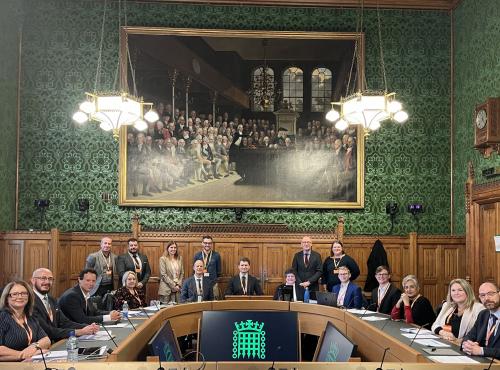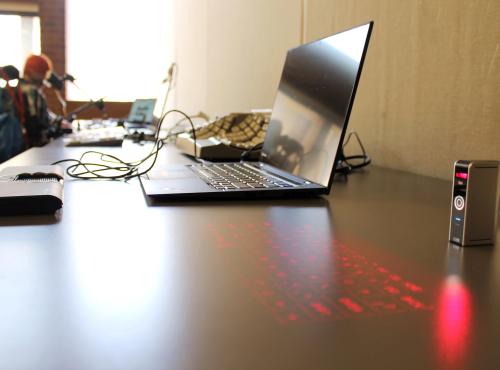Look ahead: what’s on the horizon for the ATech Policy Lab
Just over a month ago, we announced the Assistive and Accessible Technology (ATech) Policy Lab. This is a new venture from Policy Connect with supporting partners Bournemouth University and the Ace Centre. The Lab brings together stakeholders from the tech and disability sectors with policymakers to design evidence-based policy that makes technology enabling for everyone.
“Technological solutions can have a life changing impact on a disabled person's life […] There is much more that we can all do, which is why I really welcome the launch today of the new ATech Policy Lab, supported of course by Policy Connect and with partners Bournemouth University and Ace Centre. […] I think we would all agree that it is critical to continue to work together in partnership on research, and design evidence-based policy solutions in this area. That will allow us to share knowledge and innovation that will also have the benefit of promoting the United Kingdom as a world leader in this field.”
Minister for Disabled People Chloe Smith MP at the launch of the Lab. Her full speech is online.
In the past month, we’ve been laying the foundations for some of the Lab’s first projects.
Innovation for independent living
The government’s UK Innovation Strategy, published last summer, set ambitions for an innovation-led economy.
We want to explore how government and private sector investment in R&D and innovation can help disabled people or those who are getting older to live independently.
In May this year, ATech Policy Lab will hold a workshop with disabled people’s organisations, the tech sector, academia and policymakers, including from Innovate UK.
“Disabled people are already using technology to break down barriers in their lives, from communication, to education, to living independently. But for too many, the support to use Assistive and Accessible Technology (ATech) still isn’t there – often because of a simple lack of awareness. The Ace Centre is a leading charity providing ATech assessment, training and information services across England, with a focus on those with complex needs. We’re proud to partner with Policy Connect on the ATech Policy Lab, bringing the expertise from our colleagues and clients, to design evidence-based policy solutions that will close the gaps in ATech provision and awareness.”
Anna Reeves, CEO, Ace Centre
Inclusion for disabled people in a digital-by-default world
During the pandemic, the government worked with grant-giving organisations as well as the private sector to improve digital inclusion for disabled people.
One such project was Digital Lifeline, funded by DCMS and delivered by Good Things Foundation in partnership with AbilityNet and Digital Unite. Director of the ATech Policy Lab, Robert McLaren, was co-chair of this project’s advisory board.
The pandemic has changed the game on digital inclusion permanently. We are entering a new digital-by-default world. This offers great promise, especially for disabled and older people, but needs ongoing work on digital inclusion to ensure that no one is left behind.
The ATech Policy Lab will convene a workshop on this topic in the summer. The workshop will consider how government and the corporate and philanthropic sectors could work together longer-term to help bring in investment to level-up digital inclusion across the UK.
“During the pandemic, technology has been a lifeline to many disabled people. But the shift to digital can itself become a barrier if people are not well supported.
“Disabled people must be at the heart of shaping the agenda to make technology meet our needs and aspirations.
"I welcome the launch of the ATech Policy Lab at the cross-party Policy Connect in partnership with Bournemouth University and the Ace Centre, and look forward to engaging with the Lab as it seeks to bring together disabled people, the tech sector, and policy makers to design public policy that takes advantage of technology to break down barriers and enable everyone.”
Kamran Mallick, CEO, Disability Rights UK
Making the case for a Centre for ATech
In last year’s National Disability Strategy, government committed to scoping the case for a National Centre for Assistive and Accessible Technology.
Last month, in Parliament, the Minister for Disabled People Chloe Smith MP reaffirmed their commitment to this and referenced the work we have done together:
“As part of the Government's ambition for the UK to be the most accessible place in the world to live and work with technology, we are exploring how we might drive improvements in public services through a Centre for Assistive and Accessible Technology.
“The Disability Unit has been delivering workshops in partnership with Policy Connect to develop options for the Centre, working with disability organisations and charities, the tech sector, government departments and academia.”
The ATech Policy Lab will continue to work with the Disability Unit to help develop plans for this Centre.
Get in touch
We are always interested to hear suggestions and topics that we could be interested in.
This month, we presented to the Our Voices group of Disabled People’s organisations, and have been meeting and talking with stakeholders and experts across the sector.
Some of the topics that we are considering working on in future include:
-
AI, ethics and disability;
-
Trade and inward investment in ATech; and
-
Local commissioning of ATech services.
Thank you to everyone who attended the launch event last month and who has been in touch with ideas since then. Please Robert.McLaren [at] policyconnect.org.uk (get in touch with me) if you are interested in working with us!
“We’re passionate about creating accessible technology that creates a fairer society for all and allows people to live better lives free from restriction. Our research and knowledge spans healthcare, engineering and digital and we want to use this expertise to make a difference in the policy landscape too.”
Professor Christos Gatzidis, Convener for Assistive Technology at Bournemouth University


